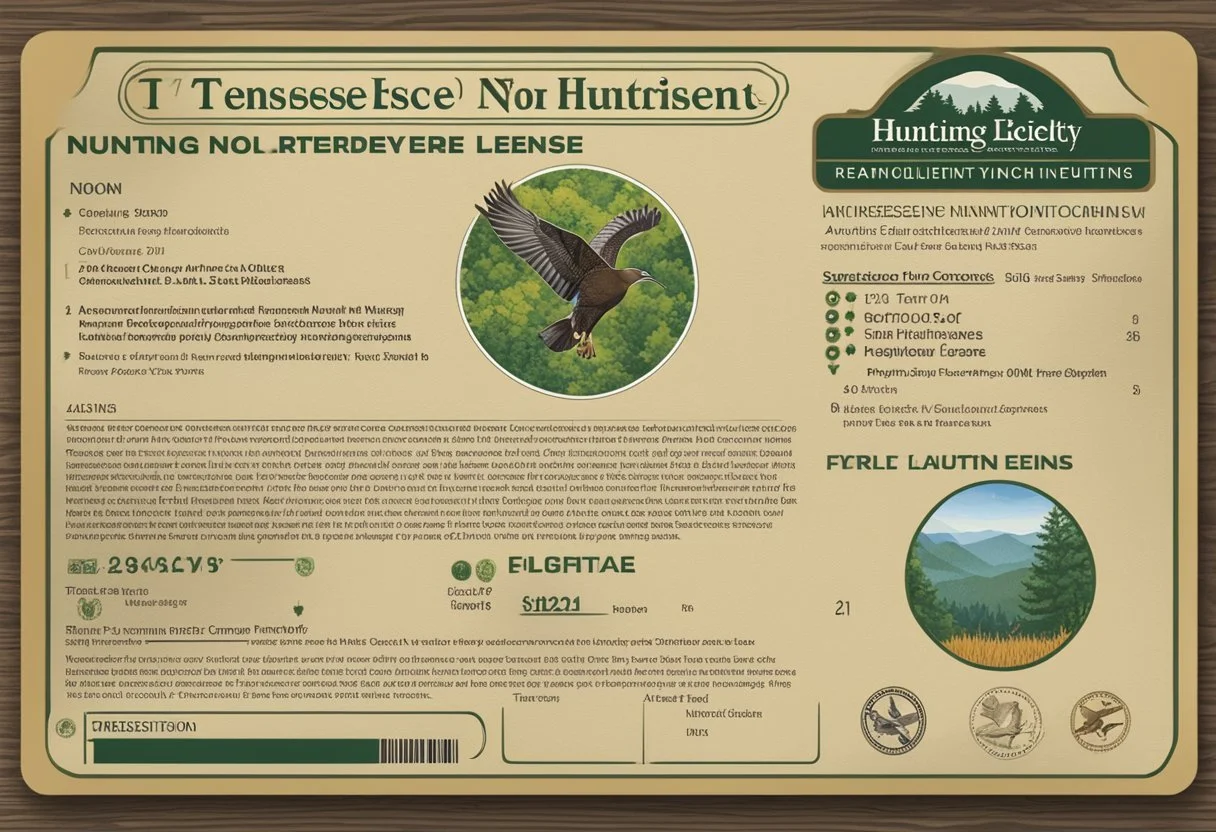How to Get a Tennessee Non-Resident Hunting License
A Guide to Purchasing and Regulations
This Article is Part of Our Guide to Non Resident Hunting Licenses by State
Tennessee offers a variety of hunting licenses to both residents and non-residents, allowing for a broad engagement with the state's rich wildlife resources. Non-residents interested in hunting within the state's boundaries have specific regulations and licensing options to consider. These licenses are essential for ensuring the conservation efforts and management of Tennessee's wildlife populations, and they are available for different durations, from short-term to annual licenses, tailored to the needs of visiting hunters.
For non-residents, understanding the cost and requirements of obtaining a Tennessee hunting license is crucial. They must adhere to the regulatory framework set by the Tennessee Wildlife Resources Agency (TWRA), which includes options for those born in the state but not currently residing there to purchase annual licenses at resident rates. These provisions offer a broad scope of opportunities, ensuring that all hunters can participate in the state's hunting seasons within the legal guidelines.
Understanding License Types
Tennessee offers a variety of license types to accommodate hunting enthusiasts, whether they are residents or non-residents. These licenses are designed to comply with state regulations while providing access to hunting and fishing activities.
General License Requirements
Non-resident hunters must obtain a license to hunt in Tennessee, regardless of age. The state issues different licenses for hunting, fishing, and combination activities, each with its own set of requirements. For example, a basic non-resident hunting license permits the holder to hunt small game and waterfowl.
Key Points:
Non-residents must have a license to hunt.
Variety of licenses available for specific needs.
Differences Between Resident and Non-Resident Licenses
Tennessee distinguishes between resident and non-resident licenses primarily on the basis of residency status. Residents are eligible for annual or lifetime sportsman licenses, while non-residents must opt for licenses that are typically valid for shorter durations—available on a daily, annual, or seasonal basis.
Resident vs. Non-Resident Licenses:
Non-residents are often required to purchase additional permits for certain game species. The fees for non-resident licenses are typically higher, reflecting the limited use and contribution of non-residents to local conservation efforts funded by license fees.
Eligibility Criteria
Purchasing a non-resident hunting license in Tennessee requires meeting specific criteria to ensure lawful hunting practices. This section outlines the various requirements and considerations for individuals who do not permanently reside in Tennessee.
Tennessee Residency Requirements
Tennessee residents are people who have a permanent place of abode in the state and who have manifested the genuine intent to make Tennessee their true, fixed, and permanent home and principal establishment. Tennessee residency is generally evidenced by a valid Tennessee driver’s license or state-issued ID. Criteria indicating residency also include voting in Tennessee or registering a vehicle there.
Eligibility for Non-Residents
Non-resident hunters—those who don't meet Tennessee residency requirements—are eligible to acquire a non-resident hunting license. Whether individuals reside in Tennessee for a short-term work engagement, as visitors, or have their permanent homes in another state, they must obtain the appropriate non-resident licensure. SSI (Supplemental Security Income) beneficiaries are required to follow the standard protocol for non-residents unless stated otherwise by Tennessee regulations.
Special Considerations for Military and Students
Military personnel not stationed in Tennessee but who maintain Tennessee as their home of record must purchase a non-resident license to hunt. However, active duty military personnel stationed in Tennessee and their immediate families are eligible for resident licenses. They need to demonstrate a genuine intent to reside in Tennessee, which can be shown with orders stationing the person in Tennessee.
For students, attending a Tennessee college or university does not automatically grant them the status of Tennessee residents. They are considered non-residents unless they have demonstrable ties to the state, such as a Tennessee driver’s license. However, full-time students with appropriate student IDs from accredited Tennessee institutions may qualify for resident licenses.
License Fees and Purchasing
When considering non-resident hunting licenses in Tennessee, it's essential to understand the fee structure, purchasing options, and processes for license replacement. The Tennessee Wildlife Resources Agency (TWRA) manages these licenses, ensuring non-residents have the opportunity to partake in hunting activities throughout the state.
Fee Structure for Non-Resident Licenses
Non-residents can expect to pay a fee of $300 for a combination hunting license, providing the ability to hunt both big and small game. Licenses are also available for specific hunting activities at various price points. The TWRA offers an annual hunting/trapping/fishing license for non-residents born in Tennessee at resident costs. Applicants are required to provide a Social Security number when applying for any type of hunting license.
Annual Hunting License: for general hunting of small game.
Annual Big Game Supplement: for hunting big game species, like deer and turkey, in addition to the general hunting license.
One-Day Hunting License: for a short-term hunting trip, ideal for non-residents on brief visits.
Where to Purchase Hunting Licenses
Non-resident hunting licenses in Tennessee can be acquired from several sources:
Online: Through the official TWRA website or Go Outdoors Tennessee.
TWRA License Agents: Located throughout the state, including sporting goods stores, hardware stores, county clerks’ offices, and marinas.
In-person purchase provides the added benefit of acquiring local insights from agents familiar with Tennessee hunting regulations and geography.
Replacement of Lost or Stolen Licenses
In the event a license is misplaced or stolen, non-residents can obtain a duplicate license specific to their needs. Replacement licenses can be requested:
Online: Via TWRA's licensing system, which may require the individual's Social Security number for verification.
In-Person: By visiting a local TWRA license agent or county clerk's office, where verification will be conducted.
A nominal fee is generally charged for the issuance of a replacement license. It's crucial for hunters to carry their licenses at all times to comply with state regulations.
Types of Non-Resident Licenses
Tennessee offers a range of license options for non-residents seeking to hunt or fish within the state. These licenses are tailored to fit different types of outdoor activities and durations, ranging from short-term visits to lifetime privileges.
Hunting and Fishing Combination
Non-residents can purchase a Hunting and Fishing Combination license. This provides the convenience of both hunting and sport fishing rights, excluding trout. It's ideal for individuals planning to engage in both activities during their stay.
Annual and Lifetime Sportsman Licenses
Tennessee issues Annual and Lifetime Sportsman Licenses for the avid outdoorsman. While the Annual Sportsman License is valid for one year, the Lifetime Sportsman License encompasses hunting, trapping, and fishing without the need for additional permits. Non-residents who were born in Tennessee may opt for the Native Tennessean Annual License, providing them annual rights at a resident cost.
Annual Sportsman License: Allows hunting and sport fishing for all species, applicable for one year.
Lifetime Sportsman License: Offers the same privileges as an annual version, but with the benefit of a one-time purchase for lifelong validity.
Supplemental Licenses and Permits
Additional permits may be required for specific activities:
Waterfowl Hunting: A Federal Duck Stamp and Tennessee Migratory Bird Permit are necessary.
Wildlife Management Areas (WMAs): For hunting in WMAs, non-residents must acquire WMA permits in addition to their standard licenses.
Special Cases: Individuals with disabilities, such as Disabled Veteran (DAV) Hunting and Fishing licenses, cater to those who are wheelchair-restricted or have specific disabilities.
Purchasing and detailed information about these licenses and permits can be found on the official Tennessee licensing website, GoOutdoorsTennessee.
Regulations and Seasons
Tennessee offers a diverse range of hunting opportunities for non-residents, each governed by specific regulations, including the Tennessee Wildlife Resources Agency (TWRA) guidelines. Seasonal restrictions and game limits are enforced to maintain ecological balance and sustainable hunting practices.
Wildlife Management Area (WMA) Regulations
The TWRA manages numerous WMAs across the state, each having unique rules that may differ from statewide regulations. To hunt in these areas, non-residents must adhere to these stipulations:
Big Game: Includes species like deer and turkey. Specific WMAs dictate unique seasons and rules for big game gun, archery, and muzzleloader hunting.
Migratory Birds: Waterfowl and other migratory bird seasons are in accordance with federal law and may require additional permits.
Game Limits: Wildlife management areas implement specific game limits; thus, hunters must confirm with the regional office or TWRA's official guidelines.
Hunters can obtain detailed regulations for each WMA from the regional offices or through the TWRA website.
Seasonal Restrictions and Game Limits
Seasonal restrictions are established to conserve wildlife populations and ensure sustainable harvest levels. These restrictions include:
Big Game Seasons: Vary by region. For instance, certain WMAs allow archery only, while others may permit big game gun and muzzleloader hunting.
Waterfowl and Migratory Bird Seasons: Aligned with federal regulations to preserve migratory patterns and populations.
Bag Limits: Hunters must observe bag limits to prevent overharvesting of game species.
Game limits and seasons are subject to change, so it is crucial to review the most current information provided by the TWRA before planning a hunting trip in Tennessee.
Special Licenses for Disabilities and Seniors
Tennessee offers specific hunting and fishing licenses to accommodate disabled veterans and seniors, ensuring that outdoor activities are accessible to those with special requirements.
Licenses for Disabled Veterans and Blind Persons
Disabled Veterans: Disabled veteran sportsmen are eligible for discounted rates on licenses. The state of Tennessee recognizes the sacrifices of its veterans and provides options for those with disabilities which are a direct result of their service. To qualify, disabled veterans should show proof of their disability status.
Blind Persons: For individuals who are blind, Tennessee provides special licensing opportunities to allow participation in fishing activities. These licenses are tailored to help blind anglers access the state's waterways and fisheries.
Senior Citizen Hunting and Fishing Licenses
Annual Senior Sportsman License: Tennessee residents who are 65 years of age or older have the option to purchase the Annual Senior Sportsman License. This license is comprehensive and permits the holder to hunt, trap, and fish without the need for additional state supplemental licenses.
Cost: $49.00
Benefits: Allows holders to apply for quota permits at no additional fee.
Permanent Senior Citizen Hunt/Fish/Trap: There is also a Permanent Senior Citizen Hunt/Fish/Trap license available for a one-time fee. This option provides a lifetime of leisure without the yearly renewal requirement, encompassing all the privileges of the traditional Annual Senior Sportsman License.
Eligibility: Residents 65 and older or those who will turn 65 during the current calendar year.
Wheelchair-bound Individuals: Special considerations are also in place for those who use a wheelchair, ensuring that accessibility and enjoyment of Tennessee's natural resources are within reach.
Licenses can be conveniently purchased from all license agents and offer a gateway to the rich hunting and fishing culture of Tennessee for disabled veterans, blind persons, and senior citizens.
Hunter Education and Legal Requirements
In Tennessee, non-resident hunters must meet specific education and documentation criteria before they are legally permitted to hunt. They must possess valid identification and proof of hunter education certification. The following subsections outline the necessary requirements in detail.
Required Documentation and Identification
Non-resident hunters are required to present several forms of documentation when applying for a Tennessee hunting license:
Valid Identification: This can include a driver's license, Tennessee voter registration card, or Tennessee vehicle registration. Hunters must ensure their identification accurately reflects their current non-resident status.
Proof of Hunter Education: Anyone born on or after January 1, 1969, must show a hunter education card when applying for a license.
Migratory Bird Permit: If intending to hunt migratory birds, a Tennessee Migratory Bird Permit is necessary.
For individuals not possessing traditional forms of identification, such as recent immigrants, a Form I-94 may serve as proof of legal entry into the United States and can thus be used when applying for a hunting license. All applications and purchases can be made through the official gooutdoorstennessee.com portal, operated by the Tennessee Wildlife Resources Agency.
Hunter Education and Certification
Hunter education is a mandatory requirement for all first-time hunters born on or after January 1, 1969. The following points outline the process:
Online Education Options: Tennessee allows for hunter education to be completed online through various approved courses. Completing such courses is essential before being eligible to hunt.
Field Day or In-Person Requirements: As of the information available, there are options to complete hunter education with no field day or in-person requirement. However, hunters need to verify the current regulations as they might have updated requirements.
The Department of Safety in Tennessee handles certain aspects of licensing and permits, including hunting licenses. It is critical for hunters to have their hunter education certificate promptly processed to legally hunt in Tennessee. Those under 10 years of age can hunt when accompanied by an adult meeting the hunter education requirements. Hunters should always check for any changes to the requirements or additional certifications that may be needed, such as for blind fishing, directly through official resources or by contacting the Tennessee Wildlife Resources Agency.
Frequently Asked Questions
In this section, you will find clear and straightforward answers to common queries surrounding the intricacies of Tennessee's hunting regulations for non-residents.
What Defines Legal Residency?
Legal residency in Tennessee is defined by possession of a valid Tennessee driver's license or state ID, issued by the Department of Safety. Non-residents are those who do not meet these criteria, including individuals without the aforementioned forms of identification. It is important for hunters to understand this distinction as it dictates the type of license they are required to procure before engaging in hunting activities.
Can Non-Residents Hunt on Private Property?
Non-residents are permitted to hunt on private property in Tennessee, but they must obtain the appropriate non-resident hunting license. Ownership or permission to use private property does not exempt one from needing a proper license. It is essential for non-residents to ensure compliance with all state hunting regulations, regardless of the property type on which they plan to hunt.
What to Do If You've Misplaced Your License?
If a non-resident hunter has misplaced their license, they should immediately contact the Tennessee Wildlife Resources Agency (TWRA) for guidance on the replacement process. During off hours, they may leave a message with their name and contact details. Prompt action should be taken to avoid any legal inconveniences while hunting.
Resources for Further Information
For individuals seeking further details on non-resident hunting licenses in Tennessee, there are established resources and online platforms available. The following information provides specific contact details and supplementary online resources to assist in the process.
TWRA Offices and Contact Information
The Tennessee Wildlife Resources Agency (TWRA) serves as the primary body for wildlife and hunting regulations in Tennessee. Prospective hunters can obtain valuable information and license assistance from TWRA offices scattered across the state. Interested parties may contact the TWRA directly at:
Main Office:
Tennessee Wildlife Resources Agency
5107 Edmondson Pike
Ellington Agricultural Center
Nashville, TN 37211
Phone: (615) 781-6500
Email: Ask.TWRA@tn.gov
Additionally, county clerks and authorized agents, such as certain sporting goods stores and marinas, can often provide license and regulatory information.
Additional Online Resources
For convenience, hunters can access a multitude of resources electronically:
GoOutdoorsTennessee.com:
This is the official portal for the Tennessee Wildlife Resources Agency where one can purchase licenses and find comprehensive information related to hunting and fishing in Tennessee.Mobile App:
The TWRA offers a mobile application that contains useful features for purchasing licenses, checking in game, and accessing pertinent hunting and fishing information on-the-go.
These resources support hunters by providing them with the necessary tools to ensure a legally compliant and enjoyable hunting experience in Tennessee.
#TennesseeHuntingLicense #NonResidentHunting #OutofStateHunting #HuntingPermits #WildlifeConservation #OutdoorAdventures #HuntingRegulations





